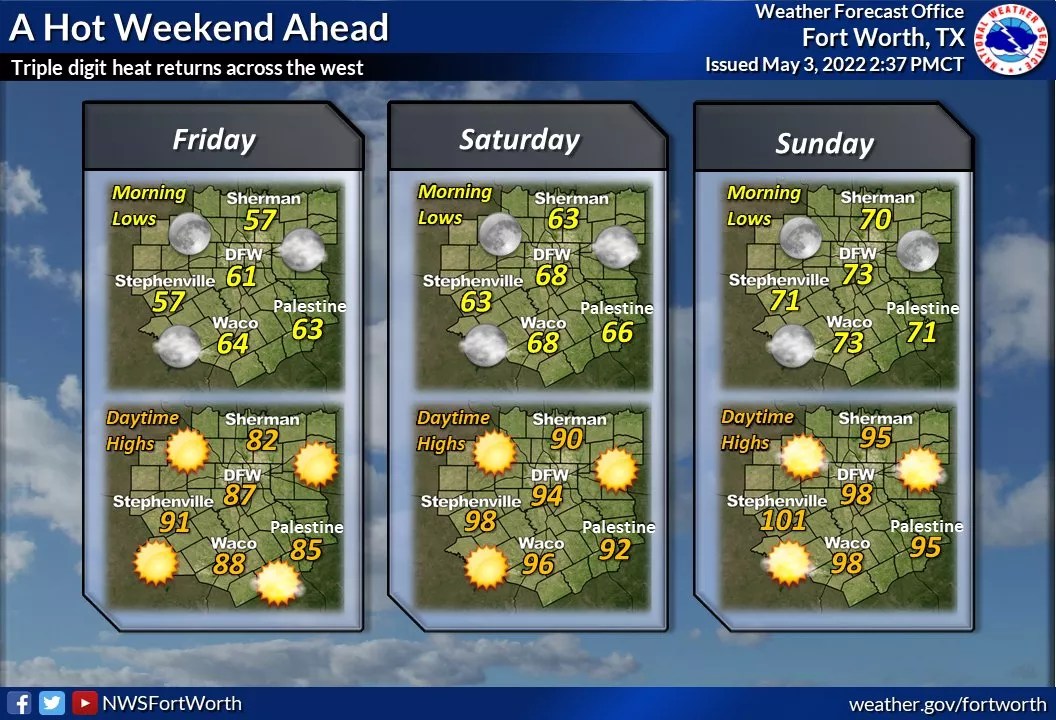
National Weather Service Fort Worth

Audio By Carbonatix
It’s going to be hot this weekend, which means the state of Texas could see larger than normal demand for power. This doesn’t bode well for a power grid that has proven unstable in the recent past.
The Electric Reliability Council of Texas (ERCOT), the nonprofit that oversees the grid, said this week it was expecting higher than normal demand for power as the result of an upcoming, unusually hot weekend.
What ERCOT is calling “extreme hot weather” will last through Monday. In the Dallas-Fort Worth area, temperatures are expected to reach the high 90s. Counties in Northwest Texas could see temperatures top 100 degrees, according to the National Weather Service in Fort Worth.
“The heat will crank up this weekend, with triple digit heat possible across the west,” the service said on Twitter. “Widespread temperatures in the 90s are expected Saturday and Sunday, with highs between 100-105 degrees west of I-35.”
Predictably, that could mean more energy consumption.
To meet that extra demand, ERCOT said it is working with the Public Utility Commission, generation resource owners and transmission utilities to prepare for the heat. The company has also asked power plants across the region to hold off on scheduled outages. Plants that already had outages in progress were asked to get back online. For now though, ERCOT seems confident the grid will remain stable.
“At the time, ERCOT projects there will be sufficient generation to meet this high demand for electricity,” the company said.
This year, after 2021’s deadly Winter Storm Uri, the whole state braced itself again for an unstable power grid. But Gov. Greg Abbott and others promised they were prepared for harsh weather brought in by Winter Storm Landon, and the grid remained stable throughout the 2022 storm with most electricity loss attributed to downed or frozen power lines.
“At the time, ERCOT projects there will be sufficient generation to meet this high demand for electricity.” – Electric Reliability Council of Texas
The city of Dallas, per a proclamation by Mayor Eric Johnson, is already urging businesses and residents to reduce unnecessary lighting at night so it doesn’t interfere with bird migration across the U.S. What’s being called “Lights Out Nights” will run through May 12, which should also help conserve energy during the hot weekend.
On its website, Oncor says dramatic weather can develop quickly in the Lone Star State. “Extreme heat, severe thunderstorms, tornadoes, floods and winter weather can damage energy infrastructure and temporarily disrupt delivery systems,” according to the company.
Oncor takes a lot of direction from ERCOT when there’s an extreme weather event that could affect the grid, but the energy provider has a team of people to help prepare for Texas heat.
Extreme heat can lead to “electrical and mechanical stresses that are going to be placed on [Oncor’s] equipment,” said Peter Babcock, senior manager of transmission equipment support ,in a 2020 press release. Oncor employees from several departments review historical data and forecasts to identify high-load areas, Babcock said.
By helicopter and with a fleet of more than two dozen drones, the company can inspect power or transmission lines from above. Meanwhile, diagnostics testers on the ground use infrared cameras to inspect substations and other equipment.
But the weather expected this weekend isn’t all that hot for Texas, and Oncor said it shouldn’t have any impact on the company’s equipment or infrastructure.
“While it is going to be too hot too early this year, these types of temperatures are normal for summer.” – Joshua D. Rhodes, research fellow
When there are trying grid conditions, Oncor may encourage its customers to conserve energy by holding off on doing laundry or the dishes during the day. Doing those things at night instead and closing your blinds during the day can help conserve energy. But with ERCOT saying everything should run smoothly this weekend, Oncor has not yet asked its customers to take extra steps to conserve.
Joshua D. Rhodes, a research fellow at the Webber Energy Group at the University of Texas at Austin, said on Twitter that the tight grid conditions have less to do with the heat and more to do with scheduled maintenance of power plants and power lines. This maintenance took some 20,000 megawatts of electricity off the grid. “ERCOT requires that maintenance to be completed by May 15, and we are just before that,” Rhodes wrote. “While it is going to be too hot too early this year, these types of temperatures are normal for summer.”
Despite this, Rhodes said, it would still be useful to conserve energy during the hottest parts of the weekend. Rhodes suggests people put off laundry until after 8 p.m., keep from using ceiling fans when they’re not in the room, and, if you have an electric vehicle, wait till night to charge it.